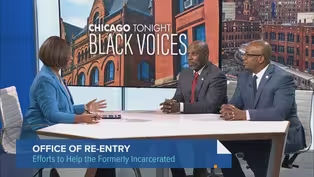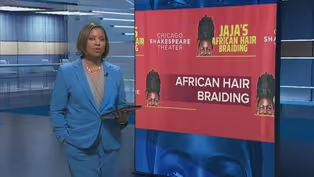Chicago Tonight: Black Voices
New PBS Documentary Tells the Story of Black Migration
Clip: 1/22/2025 | 8m 22sVideo has Closed Captions
About 6 million Black people left the South in the Great Migration between 1910 and 1970.
A four-part documentary from Henry Louis Gates Jr. explores the Great Migration of the 20th century while also looking to modern-day tales of Black migration — both back to the South and from Africa and the Caribbean.
Problems playing video? | Closed Captioning Feedback
Problems playing video? | Closed Captioning Feedback
Chicago Tonight: Black Voices is a local public television program presented by WTTW
Chicago Tonight: Black Voices
New PBS Documentary Tells the Story of Black Migration
Clip: 1/22/2025 | 8m 22sVideo has Closed Captions
A four-part documentary from Henry Louis Gates Jr. explores the Great Migration of the 20th century while also looking to modern-day tales of Black migration — both back to the South and from Africa and the Caribbean.
Problems playing video? | Closed Captioning Feedback
How to Watch Chicago Tonight: Black Voices
Chicago Tonight: Black Voices is available to stream on pbs.org and the free PBS App, available on iPhone, Apple TV, Android TV, Android smartphones, Amazon Fire TV, Amazon Fire Tablet, Roku, Samsung Smart TV, and Vizio.
Providing Support for PBS.org
Learn Moreabout PBS online sponsorshiparound 6 million black people left the American south for brighter pastures in what's known as the great migration.
A new four-part PBS documentary series from Henry Louis Gates.
Junior tells not only that story but also modern-day stories of black migration.
Both back to the south and from Africa and the Caribbean.
Here's a look.
>> Movement is a really concrete way of measuring your freedom.
Realizing that I can make a choice to pick up and all over again.
Elsewhere.
If that's not the most transformative decision that you can make.
I don't know what is.
>> joining us now, our mighty saying Stack Rice, president and CEO of the Chicago defender Charities and via Zoom is filmmaker May let you say Sims who directed the series along with her colleague Julia Marchese.
Thanks to you both for joining us.
Thank you.
Very exciting.
nightly Fay Sims.
Let's start with you first.
What motivated you to tell this story?
>> And I mean that the series is essentially a brainchild of Doctor Henry Louis Gates.
But we as a team really wanted to make a series that illustrates.
>> Just how >> migration is the defining factor in the Black American story that's ongoing as well as America large and you know me personally, I a descendant of migrants to Chicago from the South, Arkansas, Mississippi, on my dad's side and from Haiti to the U.S. and those migrants and in Chicago as well.
>> 80 during that first wave of the great migration from 1910, to 1940, the Chicago Defender newspaper.
It dubbed the City the promised Land.
Yes.
What was it about the Chicago that attracted so many migrants to the city?
>> I would say definitely I the push of I would call the father the great migration.
We can claim that for Robert.
Thanks, Dhaka, but my great grand uncle.
He was the founder of the Chicago defender 19.
0, 5, And it was his headlines.
come up north and prosper.
There's more jobs than there are men to fill them.
He called it the promise land.
They posted jobs in the in the newspaper as well as places to live.
And so far there are opportunities there.
Thanks to the newspaper being distributed throughout the south from the Pullman porters.
>> And you are you're keeping his spirit alive today.
You brought us a copy of the newspaper that publishing today, the defender legacy.
And this one is is a special edition.
This is a special edition, especially for, you to celebrate this screening and the wonderful documentary that's coming out.
So.
>> But we were just wanted to let people know that.
I mean, this is a wonderful day for Chicago because Chicago can definitely claim it was a huge callous when it came to the great northern migration because of the Chicago defender and the urging of Robert thanks to cap it.
>> Nyla the first episode.
It also tells the story of an iconic photo from the migration and is that of the Arthur family?
But many don't actually know the story behind that photo.
Tell us a little bit about that.
>> Yeah, that's absolutely You know, I worked on several history documentary series and it's a very rare.
Thank you.
Get to learn the story behind the photographs and Dr moves case actually gets to sit down with some descendants of the Arthur family.
And it's kind of finding your roots and reverse.
He gets to hear their story from them.
And it's it's written tax allies because this a photograph that is history books.
It's been used and magazines is probably the most use photographs migration history and as Reagan tax allies for their story as we can alliance has a story of terror.
It's actually a heartbreaking story and really eye opening.
>> And don't think we're giving anything away by telling, you know, about the terror that family was fleeing because folks are still watch the So tell us about the terror that that family was fleeing.
That is not a parent in that photograph.
It's there.
>> Yeah, I don't want to give too much away.
But, you know, during this air of the great migration, especially it happened during both ways, but especially during the first wave you there were hundreds of Lincoln's happening.
Southern apartheid was hard enough terms of Jim Crow, black, black holes limited people's livelihoods.
But this family, you know, were sharecroppers and there was threat and actual violence.
And I hope viewers able to watch learn something from I think it's really telling of what people went through.
>> You also look at a careful about calling it reverse migration, but it is the migration of folks, you know, from the north back to the southern states.
Here is Henry Louis Gates Junior talking to former Georgia State representative Stacey Abrams.
>> When did you become aware of the phenomenon the reverse great migration.
You could feel it.
He lived in Atlanta.
You saw our population growing year-over-year decade over a decade and you realize something was happening.
>> Because there was another case of what was so-called reverse migration, which was white southern races, sending busloads of black people to the And that's another.
That's another story entirely all.
But what about the northern or western life began pushing blacks back towards the south, both in the 70's still It I'm come to you for that.
>> Well, it's interesting because we find that.
you know, it's interesting make then it was very Those are things that push this out the south to the north.
And now there's things that pushing out of the north back to the south it makes sense.
I've talked to friends about all the time and dream about going somewhere.
Well, one and just say easier life.
>> You know, but it's interesting that reverse migration.
>> there were struggles in the north as well, like the racism still existed, Maleah because you also look at, you know, new waves of black migration from Africa and the Caribbean.
What is pulling those folks to the states?
>> And I mean, the American dream is so powerful.
You believe just represents opportunity >> also, you know, I think we can't take for granted that Africans in Caribbean's were also reading newspapers the thinking about black life in America to I mean, I think the great migration, which was happening at the same time as early Caribbean migration and then and then in later years was creating these black metropolis isn't cities that created a modicum of freedom for any black person.
Part of the desk for us.
So in the African Caribbean episode.
We cover a wide history, there are larger numbers from both communities in more recent decades particularly African migration.
Surprisingly, there's that statistic that between 1990, in 2000, the numbers surpassed those of the enslaved that came through the Atlantic slave trade.
So, wow, you know, patients are actually helping too, you know, complicate and and make you know, the black American population a bit more diverse and more pan African.
>> All right.
where we'll have to leave it on because obviously series is very rich.
And so there's a lot for people to get into.
My thanks to you both elite basins it thanks to Christ.
Thank you so much having a month.
Yes, your and the first episode of great
Chicago's New Director of Reentry on His Goals for the Office
Video has Closed Captions
Clip: 1/22/2025 | 9m 17s | The Office of Re-Entry is helping formerly incarcerated people get back on their feet. (9m 17s)
‘Jaja’s African Hair Braiding’ Takes Audiences Inside Harlem Salon
Video has Closed Captions
Clip: 1/22/2025 | 2m 9s | The Tony Award-winning Broadway play runs through Feb. 2 at Chicago Shakespeare Theater. (2m 9s)
Providing Support for PBS.org
Learn Moreabout PBS online sponsorship
- News and Public Affairs

Top journalists deliver compelling original analysis of the hour's headlines.

- News and Public Affairs

FRONTLINE is investigative journalism that questions, explains and changes our world.












Support for PBS provided by:
Chicago Tonight: Black Voices is a local public television program presented by WTTW

